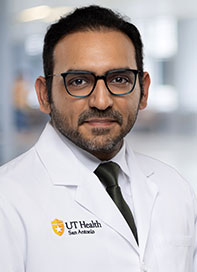Select University Health Transplant Institute for high-quality, innovative deceased- or living-donor liver transplant surgery. Our compassionate, patient-centered care will put you at ease.
Before Transplantation
If your liver specialist recommends a transplant to treat your liver failure, you’ll need to go through our evaluation and approval process. Your transplant assessment will include:
- Doctor or self-referral
- Your first visit
- Evaluation and testing
- Candidacy and selection
- Living donation or waiting list
Advanced, Experienced Transplant Team
Feel confident when you choose an experienced liver transplant surgeon at University Health. Our board-certified surgeons have the knowledge and training to perform your liver transplantation expertly. And since our program’s beginning in 1992, our team continues to advance the surgical techniques and facilities we use for your surgery.
You’ll get patient-centered care from a dedicated transplant care team who will support you and your family’s needs during your recovery.
When a Liver Is Available
Count on your transplant coordinator to call you when a deceased-donor liver is available for you. Plan to be on your way to the hospital within one hour of receiving our call. Do not eat or drink anything after notification to come for a transplant. Bring:
- Health insurance information
- Medical records
- Medications
- Prepacked suitcase
When you arrive at University Health, report to the 12th-floor transplant area.
Deceased-Donor Liver Considerations
Partnering with us means you’ll have the option to get a liver from an extended criteria donor (ECD). Selecting an ECD expands your donor pool. EDC means the deceased donor may be over 60 or have mild liver abnormalities, such as a history of Hepatitis B or C exposure.
Talk to your transplant coordinator or doctor about the benefits and risks of each option. You can accept or decline the liver.
Transplant Surgery Preparation
Expect to have pre-transplant tests before surgery to make sure you are ready for your liver transplant. You have the right to decide whether or not to have a transplant. Your doctor will ask you to sign an informed consent form before your transplant.
Donor Liver Retrieval
Your University Health transplant team will retrieve the donated liver while you are preparing for surgery. Rest assured a complete donor liver evaluation will determine if the liver is right for you.
Canceling your transplant surgery may be necessary if:
- The donor's liver is not suitable for transplant
- You have a new medical problem
- You have any signs of infection
- You test positive for alcohol or drugs
Types of Liver Transplants
Depending on your condition and the donor's liver, your skilled transplant surgeon will perform a whole liver or split liver (part of a liver) transplant. If you get part of a liver from a deceased or living donor, the transplanted portion will enlarge to normal size in time. And the living donor’s liver will grow back to its original size.
Your Liver Transplant Surgery
The liver transplant will take three to five hours. A doctor will give you medication to make you sleep during the operation. Your surgeon will:
- Make a boomerang-shaped incision under your rib cage
- Remove your old liver
- Attach the donor liver to your blood vessels and bile ducts
Your family will wait in a room close to the operating room, and our staff will keep them informed of your progress.
After surgery, your transplant surgeon will speak to your family or caregiver about the surgery while you will recover in the transplant intensive care unit.



